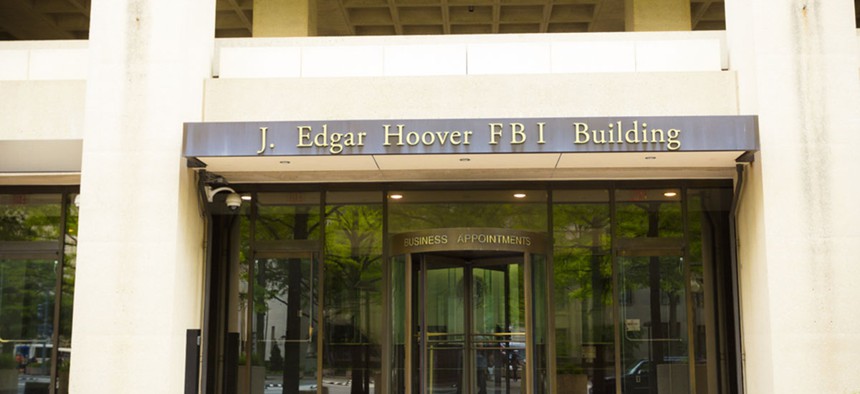
Maria_Ermolenko / Shutterstock.com
Can the FBI Sway an Election?
The agency is investigating more emails related to Hillary Clinton. Whether or not it finds something in the next 11 days, its announcement could affect the outcome on November 8.
The FBI has announced that it is investigating newly discovered messages related to Hillary Clinton’s use of a private email server. According to The New York Times, these emails were found in the course of the agency’s investigation of the former New York Congressman Anthony Weiner and the longtime Clinton aide Huma Abedin.
With just 11 days to go until November 8, FBI Director James Comey’s decision to disclose the investigation could affect the election. The timing raises two important questions: What was his legal obligation to provide the public with information on this investigation, if any, and what could happen to him as a result of his choice?
It’s possible Comey was partly motivated by fear. When he chose not to prosecute Clinton for her use of a private email server, he was brought before Congress to defend his decision; a hearing at the House Judiciary Committee in September lasted nearly four hours. If he failed to amend his testimony and inform Congress about new evidence potentially relevant to that case, he would almost certainly face more hearings—particularly if the agency discovered information about Clinton’s actions after November 8. “I have a suspicion that he didn’t just do it because he felt like doing it,” said Richard Painter, a law professor at the University of Minnesota who served as the chief ethics lawyer in the Bush administration from 2005 to 2007. “This close to the election, you have to get out with it. How many of these dang things are there?”
The opposite scenario is equally consequential, though: What if it turns out these new emails have nothing to do with Clinton, yet Comey’s announcement hurts her chances in the election? “There obviously needs to be some sensitivity to the fact that an FBI investigation can be mischaracterized and abused in the context of an election,” Painter said.
In other words, Comey faces an impossible choice. If he refused to tell Congress, officials could claim he knowingly withheld information that was important to the American people. But in disclosing the investigation, he’s potentially shaping the outcome of the election; it’s unclear how the public will interpret the announcement, but the stock market has already taken a dive. As Benjamin Wittes argued on the website Lawfare, “Comey and the FBI are in a terrible position here, one in which they would be accused of playing politics whatever they ended up doing.”
Democrats are already saying Comey has acted irresponsibly. In a statement, Clinton’s campaign manager, John Podesta, argued that “the director owes it to the American people to immediately provide the full details of what he is now examining.” At least one group, which is associated with the anti-Trump Keep America Great PAC, announced that it filed a complaint about Comey with the Department of Justice. “It is an obvious attack from a lifelong Republican who used to serve in the Bush White House, just to undermine her campaign,” said Scott Dworkin, an adviser to the PAC, in an emailed statement from the group.
Comey’s letter to Congress revealed few details about the possible connection between the Weiner-Abedin emails and Clinton, nor about the potential classified nature of the messages. That’s part of what Democrats are calling him out on: With so little information available, Clinton’s political opponents are free to speculate about worst-case scenarios. As Donald Trump said on Friday, “This is bigger than Watergate.”
The former Department of Justice spokesman Matt Miller argued on Twitter that Comey has violated the precedents of his office by commenting publicly on the Clinton email investigation in the past. “Today’s disclosure might be [the] worst abuse yet,” he wrote. “Why? Because voters have no way to interpret FBI/DOJ activity in a neutral way. Who is the target of an investigation? What conduct?”
Even if Democrats wanted to punish Comey for his actions after the election, their options would be somewhat limited. The president nominates the FBI director, who is then confirmed by the Senate to a 10-year term. If the Clinton administration wanted to get rid of Comey directly, it theoretically could. It’s happened before, although it’s rare: Bill Clinton dismissed FBI Director William Sessions on the grounds that he had improperly used an FBI plane for personal purposes. But in this case, it would be difficult to prove Comey acted irresponsibly; while it’s not clear that the president has to have “cause” to fire an FBI director, a politically motivated dismissal could provoke backlash. Congress could also impeach Comey, but that would be an arduous process.
The bottom line is this: Comey had reason to fear the consequences of inaction, and there may not be legal ways for Democrats to penalize him for the disclosure. His decision might defy the norms of the office, but he’s also in totally new territory: a major-party presidential candidate undergoing investigation while running for office. Painter said he thinks Comey acted in the public’s interest, not least because Clinton may shortly become president. “I have very strong worries about Donald Trump’s stability, his ethics,” he said. “They make email look like nothing. That’s all the more reason the American people are entitled to information here.”
While there might not be legal consequences to Comey’s actions, as ever, the best forms of punishment are political. Ever since Comey declined to prosecute Clinton, Republicans have accused him of bias and malfeasance. Now it’s Democrats’ turn to condemn him.






